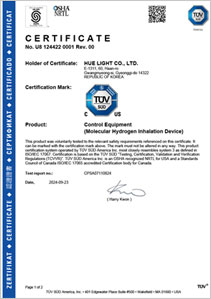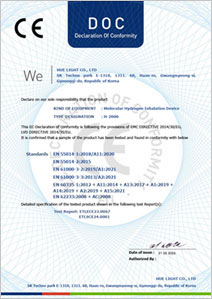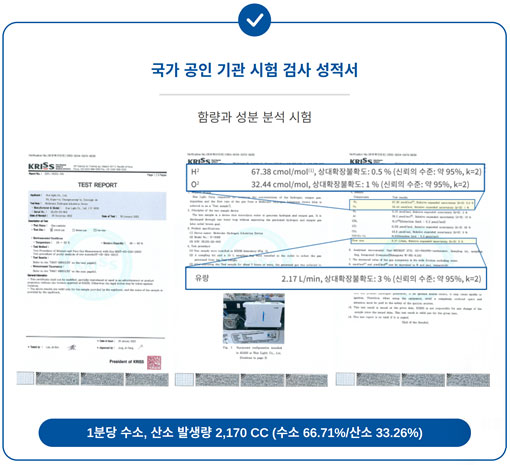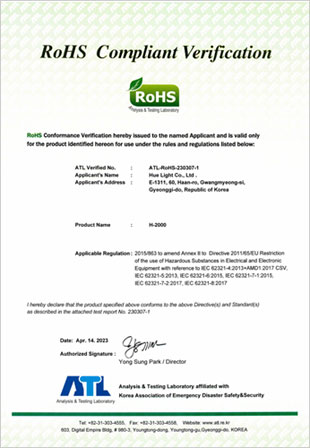Hydrogen Inhalation therapy (HIT)
Hydrogen inhalation
Hydrogen inhalation has been actively researched in the field of health since 2007.
As of December 2024, over 2,000 research papers have been published on the physiological indications of hydrogen inhalation, including its antioxidant effects. This growing body of research highlights the potential health benefits of hydrogen inhalation therapy.
-
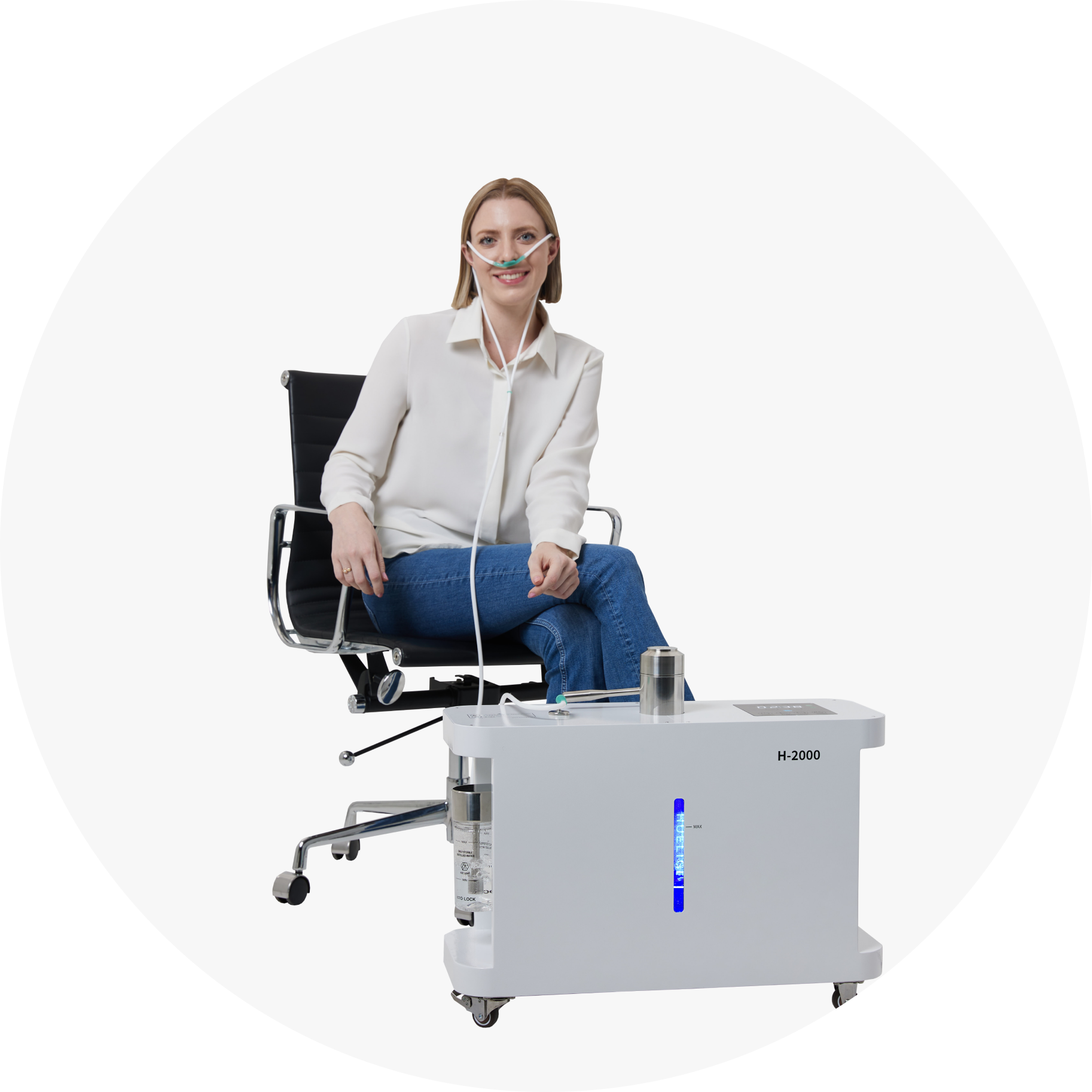
What is important in a hydrogen inhalation device used for health purposes?
Materials such as iron, copper, aluminum, rubber, silicone, and plastic generally react with oxygen and undergo oxidation.
Therefore, the material composition of the components in a hydrogen inhalation device is extremely important. Even components that meet the standards for food-grade containers must be made of materials that do not react with oxygen or hydrogen gases.
This equipment exclusively uses components made of materials that do not react with oxygen or hydrogen gases for all internal and external parts that come into contact with gases or water.
-
Remember 3 things about hydrogen:

Hydrogen is naturally gas

It has a natural property to spread and expand quickly

It is the smallest molecule to penetrate through
even the bones and the muscles
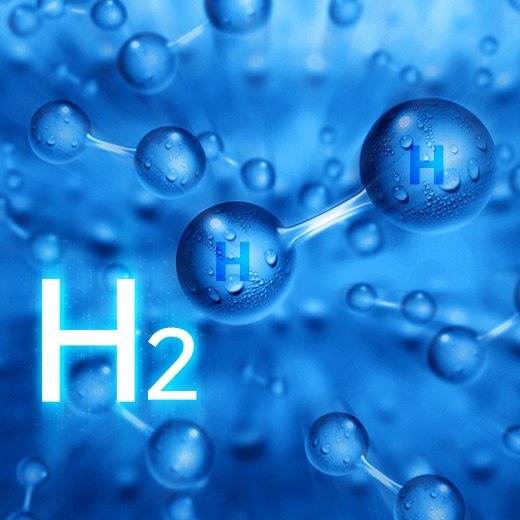
-
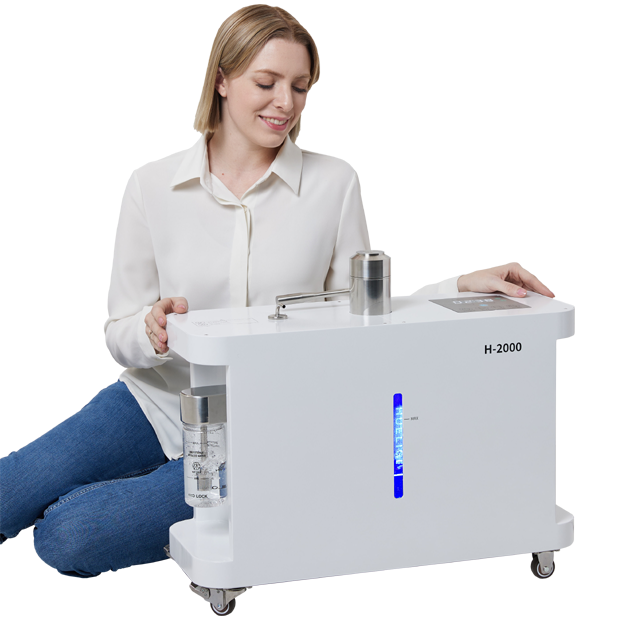
Hydrogen Inhalation in your life
-
You can do hydrogen inhalation therapy while you are working at the office, while you are reading, resting and even sleeping.
-
You can expect to see the changes in the body when you do hydrogen inhalation therapy for a long time. But, the effect would vary by individuals (see exemption clause)
-
It would be great for chronic fatigue, but this would vary by individuals (see exemption clause)
-
-
Hydrogen appliances
needed for the family!
-
Hydrogen inhalation:
The longer you do it, the more effective it becomes.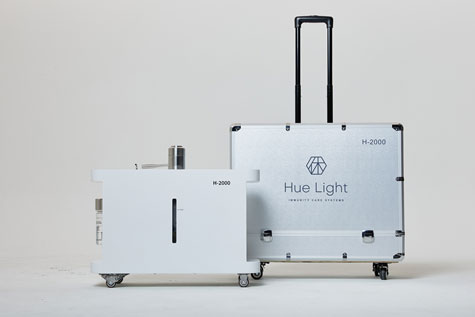
This hydrogen inhalation device is a consumer product, not a medical device.
Therefore, it has obtained consumer product certifications, including the North American NRTL certification (USA and Canada), European CE certification, and KC certification.



Product Advantages and Features
-
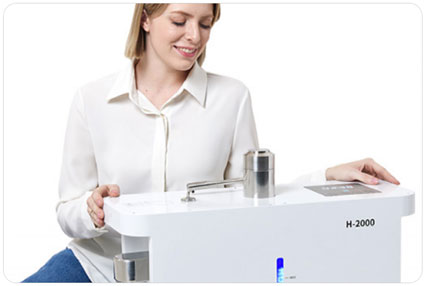
Various Applications
Clinic Centers, Hospitals, Individuals
Size and portability designed for easy use in hospitals and homes
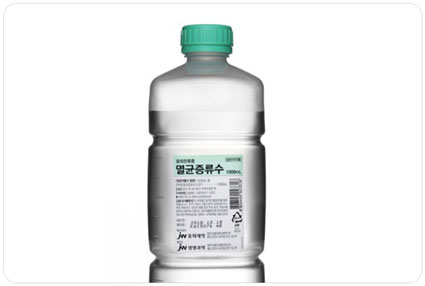
No Worries About Maintenance Costs
It can be easily used by simply refilling with sterilized distilled water sold in pharmacies.
-
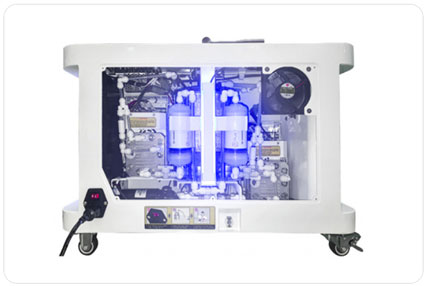
Easy Maintenance
All components are modular, allowing for easy replacement without special tools or expertise.

Simple Operation
Control buttons designed for easy operation by anyone
Product Certification
H-2000 Certified Test Report
Related publications
In order for you to gain the power of hydrogen to restore your health, you would need to gain proper knowledge about hydrogen
Hydrogen Inhalation Q&A
The following content is based on the findings of global research papers on hydrogen inhalation and is not intended to replace the advice of a physician regarding diagnosis or treatment.
-
Q
1. What is the physiological principle of hydrogen inhalation therapy?
Answer: Hydrogen Inhalation Therapy aims to remove or neutralize excessive reactive oxygen species (ROS) in the body or influence mitochondria to prevent oxidation during cellular regeneration by inhaling hydrogen gas. The physiological principles by which this therapy acts on the human body are as follows:
1. Antioxidant Effect: Hydrogen, as a very small molecule, can easily pass through cell membranes and be absorbed into the body. It acts as a powerful antioxidant, removing or neutralizing excessive reactive oxygen species (ROS) within cells. ROS are naturally produced in the body but can lead to inflammation, aging, and various chronic diseases when excessively accumulated. Hydrogen combines with these ROS and converts them into harmless water (H₂O), thereby helping to reduce oxidative stress within the body.
2. Cell Protection: By removing reactive oxygen species (ROS), hydrogen reduces oxidative damage to cells. This prevents damage to vital biomolecules such as cell membranes, proteins, and DNA, helping to maintain cellular function and reduce inflammatory responses. Notably, as a neutral molecule, hydrogen rapidly diffuses throughout various tissues and organs in the body, allowing it to act systemically rather than being limited to specific areas.
3. Anti-Inflammatory Effect: Hydrogen is known to inhibit signaling pathways that trigger inflammatory responses. Through its anti-inflammatory effects, hydrogen inhalation can help alleviate symptoms of inflammatory conditions, such as arthritis and inflammatory bowel disease.
4. Improvement of Mitochondrial Function: Hydrogen can help enhance the function of mitochondria, the cellular organelles responsible for energy production. By reducing oxidative stress within mitochondria, hydrogen increases the efficiency of energy production and boosts the physiological activity of cells.
References
Frontiers - Hydrogen Therapy Review(Frontiers). https://doi.org/10.3389/fphys.2021.789507
MDPI - Molecular Hydrogen as Medicine(MDPI).
Hydrogen 2021, 2(4), 444-460; https://doi.org/10.3390/hydrogen2040025
Hydrogen inhalation therapy is an ongoing field of research, requiring further clinical studies to elucidate its specific mechanisms and long-term effects. However, current findings suggest that it plays a significant role in antioxidant and anti-inflammatory actions, as well as in supporting brain neural cells. -
Q
2. Does the hydrogen gas in hydrogen inhalation devices explode?
Answer: The hydrogen gas generated by a hydrogen inhalation device is immediately released outside the equipment upon production. For an explosion to occur, hydrogen gas must be stored under compression in a container, and that container would need to rupture suddenly and ignite simultaneously. However, since hydrogen inhalation devices do not include such storage containers, explosions are not possible.
That said, the emitted gas is inhaled through a nasal cannula. If the outlet tip of the device comes into contact with an open flame, such as a lighter or match, sparks or flames could occur. Therefore, if used in an extremely dry environment, static electricity may be generated. It is advisable to use a humidifier to maintain indoor humidity at around 55–60% in spaces where hydrogen generators are operated. This precaution also applies to oxygen generators.
By adhering to safety regulations, the risk associated with these devices is extremely low. -
Q
3. Is a hydrogen inhalation device a medical device?
Answer: Hydrogen inhalation therapy and its devices are regulated differently in each country. In Japan, hydrogen gas inhalation is used as a therapeutic method. In China, during the COVID-19 pandemic, it was classified as a medical device for the treatment of chronic obstructive pulmonary disease (COPD), but most of the products sold are general consumer goods.
In other countries, as of August 2024, there are no clear legal regulations regarding hydrogen inhalation devices. Therefore, hydrogen inhalation devices cannot be registered or approved as medical devices and are classified as general health devices or consumer products.
Note: Similar to hydrogen inhalation devices, oxygen concentrators were also regulated as medical devices only after many people used them for extended periods, and the relevant laws were amended accordingly. -
Q
4. How often should hydrogen inhalation be performed?
Answer: The frequency and duration of hydrogen inhalation can vary depending on an individual's health condition, goals, and the recommendations of a professional.
The important thing to note is that hydrogen inhalation has no known side effects, and the more it is done, the better the potential benefits.
The general recommendations are as follows:
1. For maintaining health and prevention:
• It may be appropriate to use for more than 2 hours daily. Each session typically lasts between 1 to 2 hours.
Note: For both healthy individuals and those with health conditions, the more hydrogen inhalation, the better.
2. For chronic disease management or symptom improvement:
• For symptom relief of chronic diseases, it is recommended to use the device frequently, such as daily or about five times a week.
• In this case, consistent use of hydrogen inhalation is important, and each session typically lasts between 2 to 3 hours per day.
3. For acute diseases or recovery:
• For using hydrogen inhalation for recovery after trauma, surgery, or managing severe inflammatory conditions, it may be performed 1 to 2 times daily, with each session lasting about 3 hours, totaling more than 6 hours, based on a doctor's advice.
• In the acute phase, more intensive therapy may be required, and the anti-inflammatory effects of hydrogen can help accelerate the recovery process.
4. Whether for long-term use:
• Hydrogen inhalation therapy is non-invasive and known to have minimal side effects, making it suitable for long-term use.
However, even for long-term use, it is important to consult with a specialist to adjust the frequency based on an individual’s health condition.
It is most effective to create a personalized plan based on individual needs.
Therefore, it is advisable to consult with a relevant specialist before use to determine the optimal frequency and duration based on your health condition. -
Q
5. Can I just drink hydrogen-rich water instead of inhaling hydrogen?
Answer: Both hydrogen inhalation and drinking hydrogen-rich water are methods of supplying hydrogen to the body, but there are significant differences in their effects and mechanisms of action. A comparison of the two methods is as follows:
1. Absorption Efficiency and Speed:
• Hydrogen Inhalation: By directly inhaling hydrogen gas, it is rapidly absorbed from the lungs into the bloodstream and distributed throughout the body. This method provides immediate antioxidant effects, allowing hydrogen to reach various tissues quickly. It can be particularly effective for tissues with high oxidative stress, such as the lungs and brain.
• Hydrogen-Rich Water: Hydrogen-rich water is consumed to supply hydrogen to the body through the digestive system. Since the absorption occurs via the digestive tract, it takes longer for the hydrogen to reach the body, and the concentration of hydrogen may decrease somewhat during the digestion process.
2. Hydrogen Concentration
• Hydrogen Inhalation: When inhaling hydrogen gas, a specific concentration of hydrogen can be mechanically delivered into the lungs. This concentration is significantly higher than the concentration found in hydrogen-rich water. Typically, hydrogen inhalation maintains a concentration of 1,000 to 3,000 cc of hydrogen per minute, which is sufficient to provide significant antioxidant effects.
• Hydrogen-Rich Water: The amount of hydrogen that can dissolve in water is limited, and hydrogen tends to evaporate over time. As a result, the hydrogen concentration in hydrogen-rich water is much lower compared to inhalation. This means the amount of hydrogen that enters the body through drinking hydrogen water is also limited.
Physically, the maximum amount of hydrogen gas that can be dissolved in water is 1,600 ppb (ppb = one billionth of a percent). 1,600 ppb means that 0.00016% of the solution is hydrogen gas, which is the maximum concentration. In reality, the concentration is usually around 1,000 ppb to 1,300 ppb. Since hydrogen gas evaporates immediately when the container is exposed to the outside, the amount of hydrogen consumed through drinking water is extremely small.
3. Uses of Hydrogen Inhalation:
• Hydrogen Inhalation: One of the advantages of hydrogen inhalation is its ability to act quickly throughout the body. It is useful for acute inflammation, pain relief, recovery after exercise, or situations with high oxidative stress. It can also act more immediately and effectively on sensitive areas such as the nervous system and brain.
• Hydrogen-Rich Water: Drinking hydrogen-rich water is a method of supplying hydrogen along with regular hydration, making it suitable for long-term health maintenance and prevention. While it can provide antioxidant benefits with continuous consumption, the effects will not be as rapid as those from inhalation.
4. Convenience
• Hydrogen Inhalation: Inhalation requires a device and the process of inhaling for a set period, which may be somewhat inconvenient for some users.
• Hydrogen-Rich Water: It is easy to carry and can be consumed anywhere at any time, offering the advantage of more convenient hydrogen intake.
5. Long-Term Health Management
• Hydrogen Inhalation: It is suitable when quick and powerful antioxidant and anti-inflammatory effects are desired, aiming for a larger amount of hydrogen to reach the body.
• Hydrogen-Rich Water: It can be useful for daily antioxidant management and health maintenance, but it may have limitations when expecting strong effects.
In conclusion, hydrogen inhalation is suitable when quick delivery of higher concentrations of hydrogen is needed for immediate effects, while hydrogen-rich water is more suitable for convenient, everyday use. Both methods can complement each other depending on the situation, and it is advisable to choose the appropriate method based on the specific goals and circumstances.
References: https://lrl.kr/OSbp -
Q
6. Who needs hydrogen inhalation therapy?
Answer: Hydrogen inhalation therapy, through its antioxidant, anti-inflammatory, and cell-protective effects, can help with various health issues. The following groups of people can particularly benefit from its effects:
1. Chronic Disease Sufferers
• People suffering from chronic diseases related to oxidative stress may benefit from hydrogen inhalation therapy. These include conditions such as lung diseases, diabetes, hypertension, arthritis, and cardiovascular diseases, which often involve excessive reactive oxygen species (ROS) damaging tissues and cells in the body.
• Hydrogen can neutralize reactive oxygen species, helping to manage these chronic diseases by reducing oxidative damage and supporting overall cellular health.
2. People experiencing chronic fatigue and stress
• Prolonged stress or fatigue can increase oxidative stress in the body. Hydrogen inhalation helps reduce oxidative stress, restoring energy levels and aiding overall fatigue recovery.
• It can be particularly effective for students preparing for exams, office workers, and athletes who seek fatigue recovery and improved concentration.
3. Individuals with Inflammatory Diseases:
• People suffering from inflammatory diseases such as rheumatoid arthritis, inflammatory bowel disease, or asthma may benefit from hydrogen inhalation to help alleviate inflammation. The anti-inflammatory effects of hydrogen help reduce inflammatory responses, contributing to symptom relief.
4. Individuals with Neurological Disorders
• Neurological disorders such as Alzheimer's disease, Parkinson's disease, and multiple sclerosis (MS) involve significant oxidative stress and inflammation. Hydrogen inhalation can help reduce damage to the brain and nervous tissues, potentially slowing the progression of these diseases and alleviating symptoms.
5. Individuals undergoing cancer treatment
• Patients undergoing cancer treatment (chemotherapy or radiation therapy) may experience increased oxidative stress and inflammation due to these treatments. Hydrogen inhalation can help reduce reactive oxygen species in the body, alleviating side effects of cancer treatment, and may assist in fatigue recovery and inflammation reduction.
6. Athletes and Fitness Enthusiasts
• Additionally, it can help speed up recovery time after exercise and reduce inflammation, benefiting overall fitness and performance.
7. Individuals interested in anti-aging and skin health
• Hydrogen's antioxidant effects can help inhibit skin aging and reduce inflammation, contributing to improved skin health. Since oxidative stress is one of the main causes of skin aging, hydrogen inhalation can play a role in preventing skin aging and improving skin elasticity.
8. People living in environments exposed to oxidative stress
• People exposed to oxidative stress due to factors such as polluted environments, smoking, excessive alcohol consumption, and irregular lifestyles can also benefit from hydrogen inhalation. Hydrogen inhalation can help reduce the harmful effects of these environmental factors on the body by neutralizing oxidative stress.
9. Individuals with Weakened Immune Systems
• For individuals with weakened immune systems who frequently get sick or are prone to infections, hydrogen inhalation can help strengthen immunity by providing anti-inflammatory and cell-protective effects. It can support the immune system by reducing inflammation and protecting cells, enhancing the body's ability to defend against illnesses.
Conclusion:
Hydrogen inhalation therapy can be beneficial for various conditions and diseases where oxidative stress and inflammation play a key role. It can be particularly useful for chronic disease patients, individuals suffering from fatigue and stress, those with inflammatory diseases, neurological disorder patients, and athletes, among other groups.
References: Molecule 2023, 28 (23), 7785; https://doi.org/10.3390/molecules28237785
Biomedical 2023 , 11 (7), 1892; https://doi.org/10.3390/biomedicines11071892
Antioxidant 2023 , 12 (6), 1241; https://doi.org/10.3390/antiox12061241 (Yonsei University College of Medicine, Wonju)
Medina 2024 , 60 (2), 245; https://doi.org/10.3390/medicina60020245
Molecule 2023 , 28 (23), 7785; https://doi.org/10.3390/molecules28237785
-
Q
7. Do students or exam takers need hydrogen inhalation?
Answer: Hydrogen inhalation can be beneficial for students or exam takers, particularly in terms of stress management and cognitive function improvement.
Here are the reasons why hydrogen inhalation could potentially help students:
1. Reduction of Oxidative Stress:
Academic stress or long hours of studying can increase oxidative stress in the body, leading to reduced concentration and fatigue. Hydrogen inhalation can help reduce this oxidative stress by neutralizing reactive oxygen species (ROS) through its antioxidant effects, which can help reduce mental fatigue and improve focus.
2. Cognitive Function Improvement:
Studies have shown that hydrogen can reduce oxidative damage in the brain, providing neuroprotective effects. Positive results have been reported, particularly in research related to neurological disorders such as Alzheimer's disease. While there have been no direct clinical trials involving students, hydrogen's antioxidant properties are likely to contribute to improved concentration and memory.
3. Stress Relief and Fatigue Recovery:
Hydrogen inhalation can aid in overall fatigue recovery. It helps alleviate both mental and physical fatigue caused by long hours of studying, which can support students in maintaining the energy required for sustained academic performance.
Conclusion:
Hydrogen inhalation can help students manage stress, improve concentration, and enhance memory.
However, it should be considered as part of a broader health management approach rather than a key factor for academic success.
For optimal academic performance, it is recommended to combine hydrogen inhalation with other effective strategies.
References: https://doi.org/10.3390/molecules28237785 Molecular Hydrogen Therapy(MDPI).
MDPI)(MDPI). Antioxidant 2023, 12(6), 1241; https://doi.org/10.3390/antiox12061241
Yonsei University College of Medicine -
Q
8. What should be considered when importing a hydrogen inhalation device or machine?
Answer: When purchasing a hydrogen inhalation device, it is important to consider several key factors to ensure you choose a safe and effective product.
The following points should be taken into consideration:
1. Safety Certification:
• International Certifications: It is crucial to check if the product has obtained international safety certifications, such as CE, FDA, or KC certification in Korea.
Additionally, verifying whether the product has hazardous substance safety certification (RoHS) or international medical device quality certification (ISO13485) ensures the device's safety and quality.
• Hydrogen Concentration: The hydrogen inhalation device should produce at least 1,200 cc of hydrogen per minute to achieve rapid effects.
For more specialized purposes, devices with higher capacities, such as 2,000 cc or 5,000 cc per minute, may be required. However, for general health management by healthy individuals, a device producing around 1,000 cc of hydrogen per minute may be sufficient.
2. Safety of Internal Components in Hydrogen Inhalation Devices:
• Potential for Material Degradation: Most hydrogen inhalation devices have internal components such as pipes or containers made of silicone hoses or plastic materials through which hydrogen gas, oxygen gas, and distilled water flow. Over time, these materials may degrade, leading to odors or chemical changes.
Since hydrogen inhalation is intended for health purposes, it is essential that the internal materials do not chemically change, releasing harmful substances into the inhaled gas.
Therefore, it is crucial to choose products that use materials that do not undergo chemical degradation when exposed to various temperatures, elements, or mixed elements.
• What to Check When Purchasing the Product: When buying a hydrogen inhalation device, it is important to contact the manufacturer or seller to inquire about the materials used in components that come into contact with water and gas.
Request the RoHS certificate, test reports from accredited national agencies, and photos and names of the materials used in the internal components.
You should also verify this information through research before making a purchase.
Note: Even materials that are safe for food containers can degrade chemically depending on the temperature, elements, and mixed substances they come into contact with.
Therefore, it is important to ensure the materials used are suitable for hydrogen inhalation devices to prevent any potential health risks.
3. Convenience and Maintenance
• User Convenience: Check if the device is easy to use and provides a simple interface. A complex machine may be difficult to manage and operate, so it's important to ensure that the device is user-friendly and intuitive.
• Maintenance: In addition to the likelihood of malfunction, consider how often parts need to be replaced and whether the device is designed in a way that allows easy part replacement or servicing by regular users.
The ease of maintenance is an important factor to ensure that the device remains functional and efficient over time.
4. Reliable Manufacturer
• It is important to purchase from a reliable manufacturer or brand. Since hydrogen inhalation devices are precision equipment, it is essential to verify that the manufacturer offers solid after-sales service (AS) policies and provides good customer support.
This ensures that any potential issues can be resolved efficiently, and the device will continue to function properly over time.
5. Price-to-Performance Ratio
• Since hydrogen inhalation devices are available at various price points, it is important to consider performance relative to your budget.
Extremely cheap products may have lower performance and safety standards, so it is advisable to select a device that offers appropriate performance at a reasonable price. This ensures you get a reliable and effective product without compromising on quality or safety.
It is important to choose a safe and effective hydrogen inhalation device by considering these factors comprehensively. -
Q
9. I would like to receive recommendations for books on hydrogen inhalation therapy. Which books are available for purchase on Amazon?
I would like to receive recommendations for books on hydrogen inhalation therapy. Which books are available for purchase on Amazon?
Videos on hydrogen inhalation therapy (HIT)
-
Hydrogen inhalation therapy
-
Hue Light’s Immune Care System
-
Hydrogen inhalation therapy
for diabetes patient -
Japan Hospital Specializing in Hydrogen inhalation therapy
-
Current state in China: how hydrogen inhalation therapy is being implemented
-
Hydrogen inhalation therapy for treating cardiac arrest syndrome
-
The effect of hydrogen inhalation therapy (Japan NHK Broadcast)
-
The effect of hydrogen inhalation therapy by Dr. Garth Nicolson
-
Whole-body PBM Therapy and hydrogen inhalation therapy
Disclaimer: This content consists of medical papers and academic information and is not intended to diagnose, treat diseases,
or replace a doctor's advice, and all outcomes may vary from person to person.
-
BAHI Therapy
-
Immune Care Magazine
-
Research/Education
-
Find the center
-
About Hue Light
-
Product Site
-
Hue Light USA


 English
English
